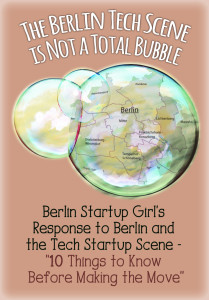 A few months ago a former Berliner (and briefly co-worker) wrote a piece in The Guardian: Berlin and the tech startup scene – 10 things to know before making the move.
A few months ago a former Berliner (and briefly co-worker) wrote a piece in The Guardian: Berlin and the tech startup scene – 10 things to know before making the move.
Like Lauren, I have also lived in Berlin for eight months. I’ve been through unfortunately many more that two boyfriends and one flat, but have been offered and kept jobs with five clients. While I can’t comment on the London scene, which Lauren occasionally uses as a comparison, I am a San Franciscan who has spent the last two years working in international startup ecosystems. I’ve been dwelling on this article since its October debut (proof that some Berliners have real jobs) and figured it was time to throw in my two cents.
The Berlin Scene is a Total Bubble
Berlin will be the next Silicon Valley. Berlin is a total bubble. Depending on the weather, or the mood, Berlin is either on the peak of success or headed toward disaster. Look, Berlin is not going to be the next Silicon Valley, but neither is London, or Istanbul, or even New York. Check out Berlin-based VC, Ciaran O’Leary’s awesome post about the “my tech hub is better than yours” attitude.
Berlin is young. We are ten years behind London, thirty years behind San Francisco, but big things are starting to happen. Issues that once held Berlin back are changing. The German VC’s are too conservative? No prob, the Americans are coming. 6Wunderkinder recently announced $19m in Series B funding round led by US-based firm Sequoia Capital. No talented developers? They will get here, especially when the money does. There are now firms like Expaway (disclosure – I do write for them) whose sole purpose is to bring talented international developers to Berlin.
Tiger Onesies
Lauren, you are right about this one. Awkward. We learn and move on.
Nobody Has A Real Job
True, but who in their right mind wants a 9 to 5 job anymore? In Berlin, this should not be a problem. And if you want something more, you may be able to find it, but it will take a lot more than working eight hours a day. Half of my friends have a “real job” at places like SoundCloud or Nokia and the other half are building their own companies from the ground up.
It is possible to fall down the party hole.
Berlin is mind-blowingly fun. But for every night I’ve had drinking Ratzeputz while bar hopping through Kreuzkolln until dawn, I’ve had 30 more going to bed at a semi-reasonable hour in order to wake up at 5am to write. I don’t think I’m the exception.
Everyone is Inward Looking
“Everyone living in it is very Berlin-centric. They talk about the city, they love it, they live and breathe it and they complain about it. When you live in a city this cool, it is bound to happen.” Think that is bad? Spend a week in the Marina District.
Getting Paid is a Luxury Not a Right
I can only speak from personal experience on this one, as I don’t have regular conversations about salary with my friends. After only really starting a company six months ago, I get paid more than enough to cover my expenses. While it is a fraction of what I made in San Francisco, my beautiful one bedroom apartment is one sixth of the cost of the warehouse I shared in SOMA. As more money pours into the ecosystem, wages, along with the cost of living, will rise.
Fail Culture Rules
Coming from the States, at first all this failure talk felt like overkill. Sure in San Francisco, we have Failcon, and everyone knows it is cool to fail. You get a pat on the back, you learned a lot and your next venture will go so much smoother. The concept of failure as a good thing isn’t a given in other countries, but it should be, even if you have to shove it down their throats.
When I was living in Istanbul doing marketing work for startups, the fear of failure was so strong that most of the entrepreneurs I met weren’t confident enough to build their own projects. If you only have one shot at success, why not pick a model that has already proven successful, like a Groupon spinoff. And we all know how well that worked. Berlin isn’t that much different that Istanbul in that respect, but it is the investors rather than the entrepreneurs that need to learn that one failure doesn’t predict future failure.
In the startup world you need to be fearless, and unless you are an American, that needs to be taught. So if more failure days lead to more innovation, bring them on.
Cafes and Bookstores
Yes, Lauren, most are candle lit with exposed brick. At least you aren’t paying $6 for toast and black coffee.
Nobody Speaks German
Gott sei Dank. Okay, okay, if you plan to live in a country for a certain amount of time you should learn the language, but in Berlin the fact that you don’t need to helps the startup scene. German is helpful, but it isn’t a prerequisite for finding a job or building a company here. Let’s look at Paris. Cool scene, if my French was good enough to converse at a business level you better believe I’d be living in the Marais begging for a job at TheFamily, but it’s not, so I stay in Berlin.
Your Circle of Friends Will Decrease
Sadly, true. Our city is a transient one. Many good friends have left, including several from the latest session of Startupbootcamp (where I worked briefly with Lauren). But these people are doing amazing things in Amsterdam, London, and back in the States. And as international entrepreneurs, we will stay in touch and cross paths again. Count on it.
The Streets Aren’t Paved With Gold
Unless you went to an elite university and are in finance (and Jesus, who wants that anyway?) the streets aren’t paved with gold. Berlin, like every city in the world is what you make of it. But after traveling to 30+ countries, and working in four of them in the last three years, I can say that Berlin has something special.
And my advice for all those looking to Berlin? It is truly the coolest city in the world right now. People will be talking about this time like they talk about Paris in the 20’s or Prague in the early 90’s. If you want to come to be an artist and fuck around, cool, but get here now because prices will go up soon enough. If you want to come and build a company, cool, but be prepared to work just as hard as you would in San Francisco. While the streets aren’t paved with gold, they are full of potential and rich with possibility.

Recent Comments